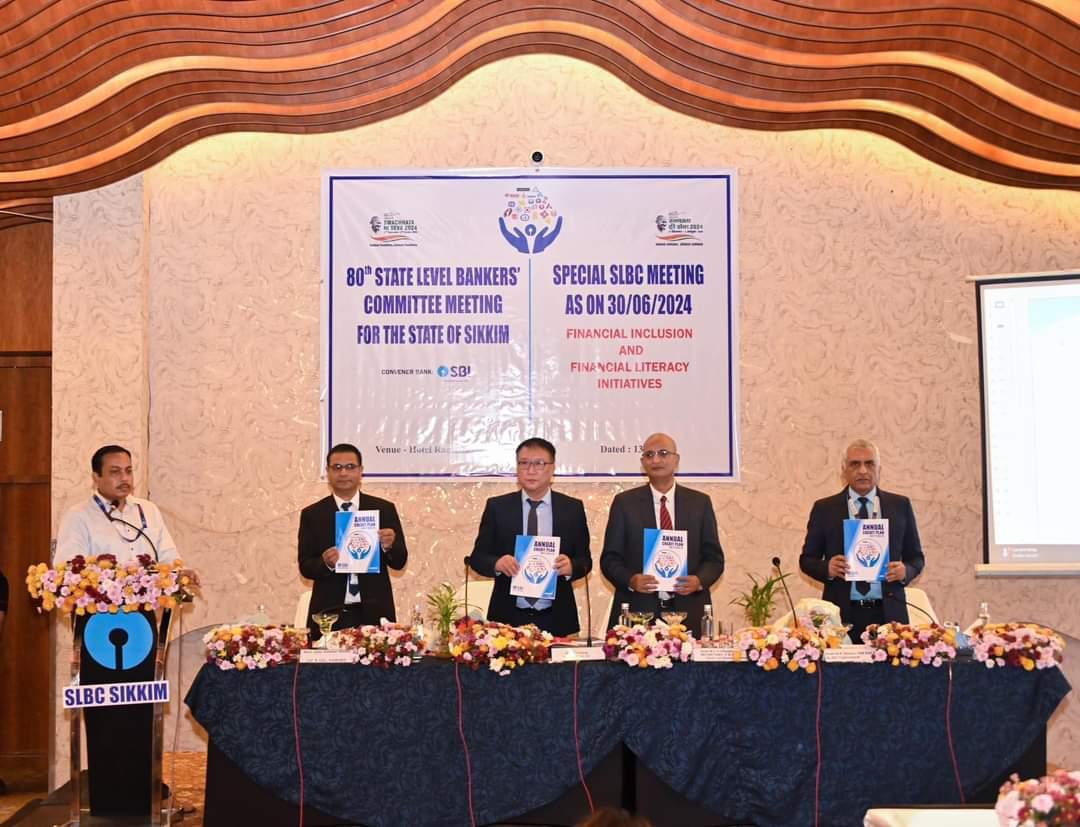GANGTOK: The 80th State Level Bankers’ Committee (SLBC) meeting for the state of Sikkim, for the quarter ended June 2024 and a Special SLBC meeting on Financial Inclusion And Financial Literacy Initiatives on 30th June was held at a local hotel in Gangtok on September 13.
The meeting was graced by Mr MCP Pradhan, Secretary, Finance, Revenue and Expenditure Department (FR&ED), Mr Thotngam Jamang, Regional Director, Reserve Bank of India (RBI), Mr Nand Kishore Singh, Convenor, SLBC-cum-General Manager (GM)-SBI Kolkata Circle, Mr Ajay Kumar Sinha, GM-OiC, NABARD, Mr Virendra Singh, DGM, SBI, Mr Kallal Bhattacharya, Chief Manager, LDM, representatives of Central Government Agencies, heads of banks in the region, Head of Departments (HODs) from various line departments of the State government and stakeholders.
Mr Nand Kishore Singh, in his opening remarks, emphasised the critical role of banking institutions in driving economic growth in Sikkim, urging all branches to actively participate in enhancing financial development across the state.
A major highlight of the event was the inauguration of the Annual Credit Plan (ACP) for Sikkim for the financial year 2024-25. The ACP sets a total credit target of ₹1,374 crores, with ₹477 crores allocated to the agricultural sector, based on NABARD’s State Focus Paper 2024-25.
The PowerPoint presentation by Mr Gadadhar Ray, Chief Manager of SLBC, reviewed the progress of banks under the ACP for the Qr ended June 2024, focusing on key indicators like the Credit-Deposit (CD) Ratio for Sikkim. The session fostered collaborative dialogue, especially around priority financial initiatives.
Additionally, he also outlined several key national financial schemes, including the Prime Minister’s Employment Generation Programme (PMEGP), PM-SVANidhi Scheme, Pradhan Mantri Mudra Yojana (PMMY), Stand-Up India, and various initiatives to promote Self-Help Groups (SHGs) and priority sector housing finance.
Similarly, his second presentation was on Financial Inclusion and Financial Literacy.
It also saw an engaging interactive session with bank officials who actively participated in in-depth discussions.
Mr Ajay Kumar Sinha underscored the importance of agriculture, noting that despite its decreasing share in GDP, it remains vital for meeting essential needs. He discussed financing mechanisms like Joint Liability Groups (JLGs) and Farmer Producer Organizations (FPOs), emphasising the potential in allied sectors such as dairy, horticulture, and organic farming. He also highlighted the significant contributions of Micro, Small, and Medium Enterprises (MSMEs) and financial inclusion through Self-Help Groups (SHGs). He stated that the state has been performing well in priority sectors. Support for financial literacy and digital literacy is encouraged, with a focus on entrepreneurship development programs, he added.
Mr Thotngam Jamang commended the progress made in banking penetration across Sikkim, applauding the collaborative efforts between government, banks, and other stakeholders in achieving targets for 2023-24 and the first quarter of 2024-25. He praised the region’s financial environment, emphasising the need for continued compliance with decisions taken in the meeting to ensure future progress. Lastly, he expressed his gratitude to the senior officers across all regions and anticipated further discussions.
The meet also witnessed an active interaction session wherein the HODs and Nodal Officers from the State Government line Departments voiced their views and placed their opinions regarding proactive implementation and proactive customer service of the various central sector schemes. Mr Jamang lauding the best environment and trust that the State Government and the Sikkimese people have given to the Bankers with 27 Banks, 197 branches and 241 ATMs across the state stated that a Joint Workshop for the Bankers and the Beneficieries is to be organised to bridge the gap between them.
Mr MCP Pradhan, in his address, stressed the importance of financial health and the efficiency of capital markets, pointing out the higher credit-deposit ratio in Sikkim compared to other northeastern states. He urged banks to prioritize financial literacy and quality of service, particularly for small-time borrowers, while stressing the need to boost rural economic growth. Furthermore, he also suggested separate measurements of credit-deposit ratios for urban and rural areas to better address regional disparities.
The program concluded with a vote of thanks from Mr Kumar Nitesh, Regional Manager of SBI, who expressed gratitude to all participants for their contributions.




